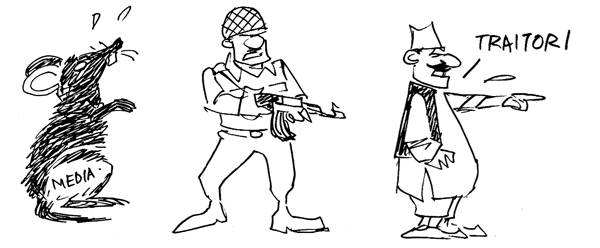
Rise and shine
Sir,
It is time for the state to stand up, exert its writ, restore the rule of law and the supremacy of the constitution in every nook and corner of Pakistan. The police, army, paramilitary forces and civil bureaucracy, whose salaries are paid by the national exchequer, funded by the taxpayer, are there to serve this country, protect the lives of citizens, and secure our borders from external enemies, be it another country or foreign funded groups, or those who challenge writ of constitution.
For more than a decade, innocent civilians have been killed and terrorized as if they were cannon fodder, by religious extremist calling themselves Taliban, or sectarian outfits and armed groups or mafias backed by political parties and land or drug mafia, while the sitting government and the security establishment have looked other way, failing to discharge their constitutional obligations.
Some political and defense analysts of this country have been involved in debates that in order to protect the state, the constitution can be suspended, abrogated or subverted. It is this mindset which is responsible for justifying the use of force to subvert the constitution. They are forgetting that no institution raised and funded by the state, or an armed private militia, has any moral or legal authority to assume unto themselves a role which the constitution forbids. It is such misplaced concepts that allowed foreign terrorists to enter this country, in violation of all rules, when no sovereign country would allow the unchecked entry or exit of foreign armed groups or mercenaries on their soil. Today we are reaping harvest of follies committed by power greedy self assumed guardians of state, who exploited religion to perpetuate their illegitimate rule
A state that fails to protect lives, property and individual rights of citizens has no right to collect taxes. Thank God, the state seems to have awakened from a deep slumber, and is ready to utilize its full resources and firepower to crush those who have raised private militias, terrorizing citizens, collecting extortion money from them, and imposing their distorted version of religion through the use of force.
Malik Tariq,
Lahore.
We are the victims
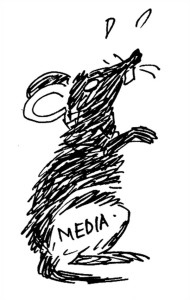
Sir,
Terrorists may be losing this war, but terror seems to have already won. This was visible in a TV anchorpersons live telephone conversation with Ehsanullah Ehsan on air.
The TTP’s co-spokesman seemed to be dictating his terms, while the anchorperson repeatedly assured him of extending his cooperation and airing his point of view. The tone of the Taliban spokesman was firm and authoritative, while the anchorperson was acting like he and the rest of the media are doing something wrong.
This shows that mentally we have surrendered, one by one, to terror. Take judiciary for instance. No court of law has ever fully prosecuted and punished terrorists. Around 8,000 terrorists and extremists are waiting for death sentences in jails but they are not being executed, courtesy the TTP threat ‘hang them and get hanged’. A court reportedly ordered the release of those apprehended red handed with IEDs in their possession, only on the plea that ‘no evidence was found of their involvement in crime, because detonators were not recovered’. Same is the case with police, the city administration, witnesses, lawyers, and judges.
Next come the religious and political parties. They are not only appeasing the terrorists but also justifying their acts of terror – most of them directly or indirectly harbouring them. Despite a surge in terrorist attacks, the PML-N government at the centre and the PTI government in KPK are appeasing them. Sometimes Imran Khan seems to be speaking on behalf of the terrorists. Jamaat-e-Islami and the JUI-F hold the government responsible, while pleading that the terrorists’ acts are justified. They are not willing to accept that this war has become Pakistan’s war against terror because we are the victims.
Our ‘independent’ media must raise awareness. It must not budge or bow to intimidating tactics of the terrorists. It would be highly dangerous if it adopts the same appeasement policy only because of the fear of being targeted. Such a situation would lead to chaos and confusion, which is the main aim of the terrorists.
Fawad F Ashraf,
Islamabad.
Life of a soldier
Sir,
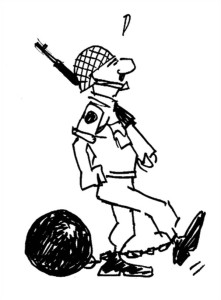 The unfathomable struggle that now ravages across the country and beyond its borders in which terrorism has assumed an unimaginable degree of ferocity has made the life of a Pakistani soldier tougher than ever. He has to fight an enemy who is ready to die. But he still fights and stands steady in his way to save his countrymen.
The unfathomable struggle that now ravages across the country and beyond its borders in which terrorism has assumed an unimaginable degree of ferocity has made the life of a Pakistani soldier tougher than ever. He has to fight an enemy who is ready to die. But he still fights and stands steady in his way to save his countrymen.He fights the pain he goes through when he holds a friend in his arms as he dies. But he gets no time to mourn and think he might die as well. He gets up and fights for what is right and against what is wrong. Then he participates in the reconstruction of the affected areas and brings the victims out of trauma by starting various health, education and irrigation projects for their socio-economic uplift. He wants to set an example for the tribal youth, win their hearts and let them know he vowed not to hesitate to make a sacrifice for protection of the motherland from internal and external aggression.
In return, he expects nothing but our support. After all the sacrifices and peacekeeping efforts he makes, a Pakistani soldier feels that he is fighting an unpopular war. Are those who fly flags from the comfort of their homes being fair to him?
Arif Hameed,
Lahore.
A long list of traitors
Sir,
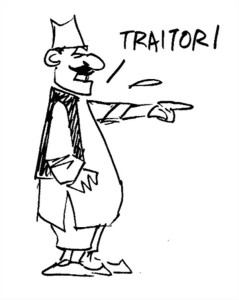 Pakistan is country of traitors, conspiracies and infidels – this is what we have read and heard since our childhood, and this is the picture of Pakistan which our historians, political leaders, ruling class, and the establishment have painted.
Pakistan is country of traitors, conspiracies and infidels – this is what we have read and heard since our childhood, and this is the picture of Pakistan which our historians, political leaders, ruling class, and the establishment have painted.A quick glance through the history will reveal that this part of the world is a breeding ground of traitors, especially in the Muslim majority areas.
Every reformer in every field – education, politics, art or religion – turned out to be a traitor in the eyes of those who did not wish to see the poor masses prosper or flourish. Sir Syed Ahmed Khan, who wanted to spread education and knowledge among Muslims, was declared traitor, agent of the British, and an infidel.
Even Jinnah was declared a traitor and a kafir for his struggle for an independent state for the Muslims of India. His right hand man Khan Liaquat Ali Khan, who had sacrificed his vast state and finally his life for Pakistan, was called an agent of the US and India, and was accused of conspiring to kill Jinnah by sending an ambulance to transfer the ailing Quaid from the airport to the Governor’s House that broke down on its way. People spreading such rumors forget that the Quaid was a man of dignity and honor of the highest order that he had instructed that no protocol be provided to him on his arrival from Ziarat to Karachi.
Begum Rana Liquat Ali Khan was also called an agent of India, although she lived in a rented house all her life, despite being a former first lady, ambassador, and governor of Sindh. She had donated a castle in the Netherlands, gifted to her by the queen of the Netherlands, to the government of Pakistan. It is in this castle that the Pakistani embassy is housed.
Mujeeb Ur Rehaman was called a traitor and an agent of India because he spoke of the rights of the Bengali people who were the third grade citizens in the eyes of the ruling establishment of the western wing.
GM Syed was another traitor, and Akbar Bugti, once the governor of his province and formerly a supporter of the Pakistan movement, also turned out to be a traitor. Khan Abdul Ghaffar Khan, loved by his people and known as Bacha Khan, was another traitor and agent of Afghanistan and India. Like his father, Khan Wali Khan also turned out to be a traitor, because he too committed the sin of speaking the truth, and asking for the rights of the people. He was an agent of USSR, India and Afghanistan.
When the people of East Pakistan voted for Mohtarma Fatima Jinnah in the 1964 presidential election, they got the Agartala conspiracy case in return. The people of Karachi, who had also committed the same sin, received bullets by the supporters of the then president. They were also called traitors.
There is a long list of traitors in Pakistan. Is it not a matter of shame for us that all these traitors were born in the land of pure?
Aamir Aqil,
Lahore.
Writ of state
Sir,
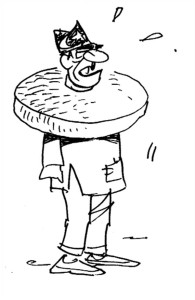 The constitution of Pakistan forbids private militias. But armed groups continue to terrorize citizens, collect extortion money, and forcibly occupy private property. Some in the elected executive, paid public servants or members of sensitive institutions have also assumed unto themselves right to ignore the constitution, justifying such acts on grounds of their distorted version of national interest or state security objectives.
The constitution of Pakistan forbids private militias. But armed groups continue to terrorize citizens, collect extortion money, and forcibly occupy private property. Some in the elected executive, paid public servants or members of sensitive institutions have also assumed unto themselves right to ignore the constitution, justifying such acts on grounds of their distorted version of national interest or state security objectives.This country, its corrupt bureaucracy, police, immigration, customs, and border and coast guards, together with greedy political and military dictators have provided a perfect breeding environment over the last few decades for the curse of terrorism to gain a foothold.
Today, terrorism, more than anybody else, is biggest threat to security of Pakistan. Our external enemies don’t have to waste billions in direct conventional conflict, all they need to do is fund a few gangs, destroy our internal security mechanism, bribe the corrupt machinery, damage our essential military installations, and create an environment where our economy comes to a standstill and sectarian and ethnic strife damage our unity.
The writ of the state was challenged when over 200 policemen were killed in target killings by known members of politically backed criminal mafia, which collected extortion, and has the capacity to cripple our nation’s economic hub. The seeds for terrorism were sown when foreign criminals were allowed to enter at will, and depart when they so desired, after they had carried out a crime. Terrorists who exploit religion to recruit the poor whose parents cannot afford private schools (the state having forfeited this obligation) have opened madrassas, where they brainwash these illiterates, making them believe that suicide bombers would enter paradise. With criminal gangs earning billions in Karachi, this was incitement for terrorists to follow suit.
No sovereign country would tolerate killing uniformed person on duty, while in Pakistan, under Musharraf and then PPP, murders of policemen were ignored for short term political gains. The writ of the law was subdued and terrorists, using religion, started attacking our sensitive military installations, indulged in jail breaks, while the state failed to perform its constitutional obligation to protect the lives and property of citizens. What can you expect when funds allocated for counter terrorism were spent on entertainment?
Ali Malik,
Lahore.
No mercy
Sir,
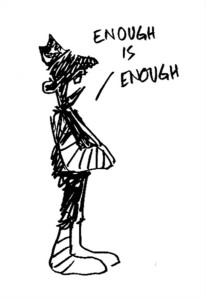 Finally, the Pakistan Army has started an operation against the terrorists. It is a welcome decision. The nation has paid a heavy price of its leaders trying to appease terrorists. The Taliban take offers of peace talks to mean that the government is weak. There is no letup in the acts of terror by the Taliban.
Finally, the Pakistan Army has started an operation against the terrorists. It is a welcome decision. The nation has paid a heavy price of its leaders trying to appease terrorists. The Taliban take offers of peace talks to mean that the government is weak. There is no letup in the acts of terror by the Taliban.In Bannu, the Taliban bombed an army compound and killed at least 20 troops. In their statement, the Taliban said they would be open to talks but only if they thought the government was sincere. They accused Islamabad and the army of helping the US to target Hakimullah Mehsud. Islamabad vehemently denied the allegation and accused Washington of sabotaging the nascent peace talks (which actually have not started so far) while blaming ‘foreign elements’ for the violence instead of the TTP.
The murder of civilians and security personnel at the hands of militant extremists has become a norm in Pakistan. So much blood is being spilled every day, yet nothing changes.
over the course of a single day across this troubled land, yet, nothing changes. Enough is enough.
Hina Khalida,
Rawalpindi.
Quetta conundrum
Sir,
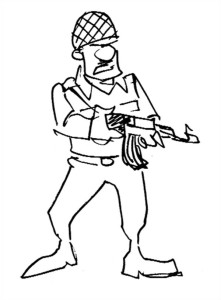 Quetta is witnessing the same scenes it did a year ago. Unfortunately, the land of pure has been turned into a land of impurities. The common man in Pakistani is paying with his life for the apathy of ruling classes. Countless lives have been lost in war on terror yet terror is terrorizing Pakistanis with unprecedented severity.
Quetta is witnessing the same scenes it did a year ago. Unfortunately, the land of pure has been turned into a land of impurities. The common man in Pakistani is paying with his life for the apathy of ruling classes. Countless lives have been lost in war on terror yet terror is terrorizing Pakistanis with unprecedented severity.No one knows how many innocent would die before the government wakes up. The ominous war on terror has shattered the Pakistani society. The demographically diverse Pakistani society has undergone a social change where faith has become so strong a reference that it now defines social relations and connections.
Morality and ethics are based on human feelings that connect us all regardless of divisions in the name of faith or nation states. We all witnessed this phenomenon during the 2005 earthquake. Lamentably, the Pakistani society has not learnt anything from an example that it had set for itself a few years ago.
The Pakistani state narrative of religious nationalism has proven counterproductive. The state’s policy to brush all its incompetence under the carpet of faith has brought things to this stage where the existence of state itself is at stake. Keeping the history in mind, every patriotic Pakistani has every reason to worry about the integrity of his or her country.
The attacks in Quetta are a big challenge for the nationalist government in Baluchistan. Elections in 2013 brought nationalists back into power after two decades. The situation is complex, with the anti-establishment nationalist government trying to establish its writ with the help of pro-establishment right government in the center, and the pro-establishment ruling elite of Baluchistan. There is not much room for the provincial government to maneuver. That is why Baluchistan looks helpless despite all its ideologically motivated resolve to uproot sectarianism.
The political future of the nationalist forces in power heavily depends on their maintaining law and order in Baluchistan. Reconciliation with armed insurgents and the elimination of planted sectarianism may prove stones of a grinding mill for the Baluchistan government. The situation demands acute political acumen.
Atif Mahmood Majoka,
Melbourne.

